Fiction
Fiction

The White Card: A Play
The White Card stages a conversation that is both informed and derailed by the black/white American drama. The scenes in this one-act play, for all the characters' disagreements, stalemates, and seeming impasses, explore what happens if one is willing to stay in the room when it is painful to bear the pressure to listen and the obligation to respond.
—from the introduction by Claudia Rankine
Claudia Rankine's first published play, The White Card, poses the essential question: Can American society progress if whiteness remains invisible?
Composed of two scenes, the play opens with a dinner party thrown by Virginia and Charles, an influential Manhattan couple, for the up-and-coming artist Charlotte. Their conversation about art and representations of race spirals toward the devastation of Virginia and Charles's intentions. One year later, the second scene brings Charlotte and Charles into the artist's studio, and their confrontation raises both the stakes and the questions of what—and who—is actually on display.

Ferrara Deux (Faits Divers)
faits divers are the various reports in a news bulletin, miscellaneous human interest stories, theorised by Roland Barthes as ‘total’ and ‘immanent’ information.
ferrara deux (faits divers) scrolls around the discovered corpse of a talented street musician named Landau, mangled and sealed into vacuum bags in the walk-in of a modern Italian-American restaurant. Street performance is content for an attention economy, playing on authenticities and profiting from recognition.
In this debut novel, artist Ivan Cheng reconfigures recent performance texts into an approximation of a murder mystery.
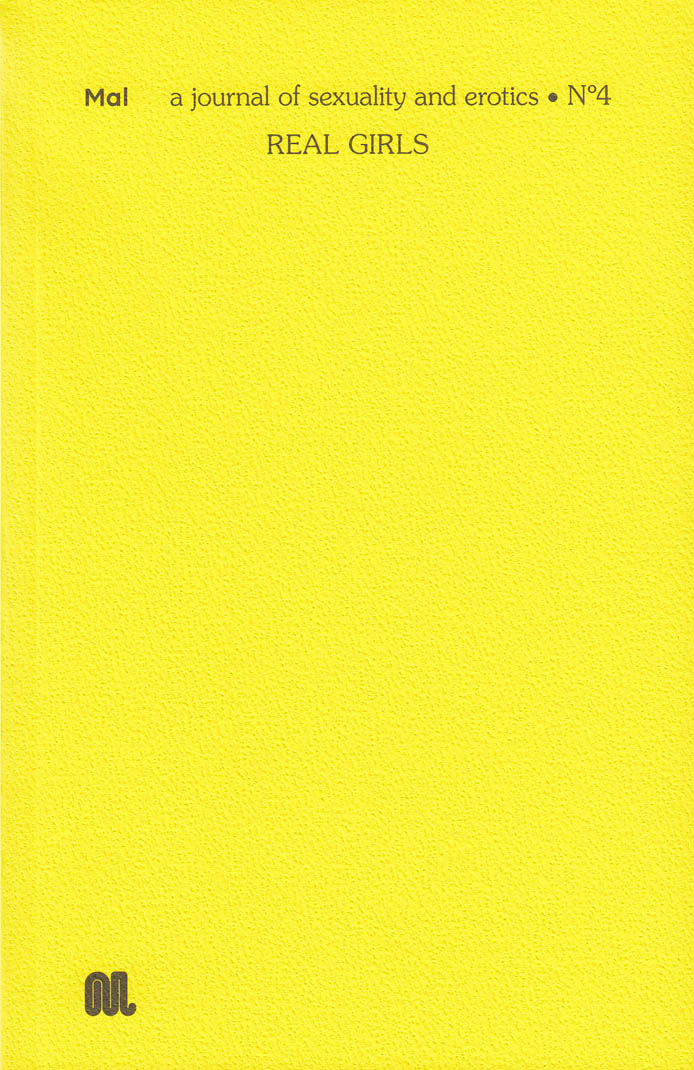
MAL, Nº 4: Real Girls
Kathryn Maris, Maria Dimitrova
On projection in three stories, four poems and a sequence of poems. Featuring illustrations by Birdie Hall.
First published: October 2019
This issue of Mal Journal considers projection, transgression and adolescence, bringing together texts that challenge received notions of innocence and moral reasoning. It features new fiction by Chris Kraus, Luke Brown and Natasha Stagg, poetry by Rachel Long and a sequence of poems by Sasha Dugdale.
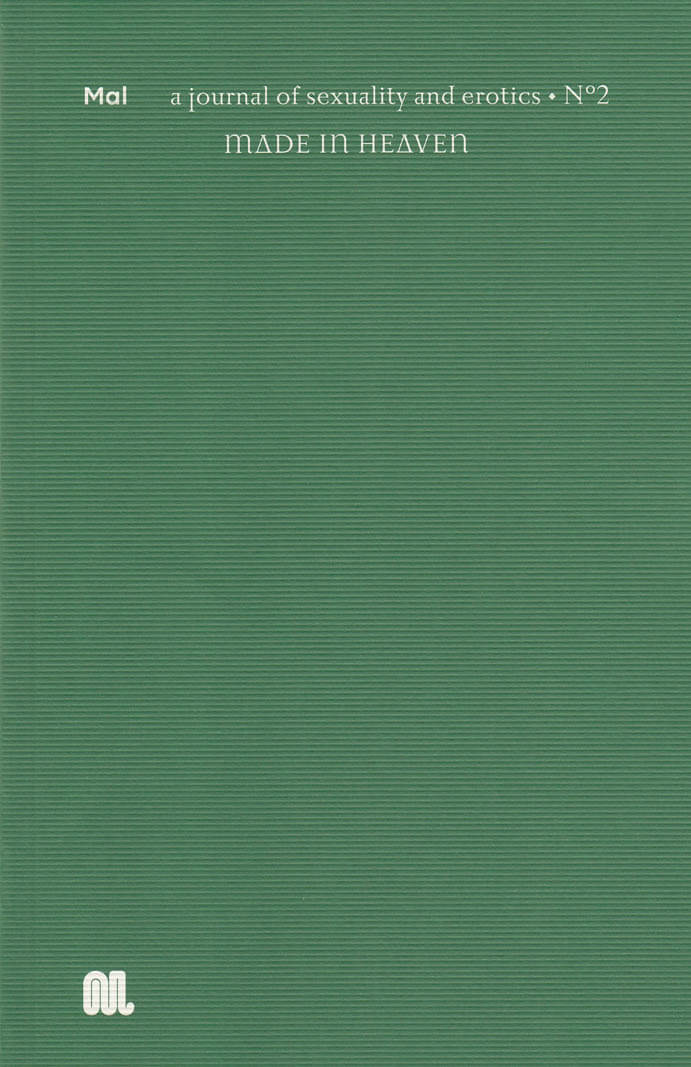
MAL, Nº 2: Made in Heaven
Kathryn Maris, Maria Dimitrova
On transcendence in two essays, a short story and four poems. Featuring illustrations by Franz Lang.
First published January 2019.
This issue of Mal features Fiona Alison Duncan on a legal case interrogating the blurred lines between sex work and spiritual practice, a personal essay on trans pleasure by Gabrielle Bellot, a short story on the volatility of mortal love by Sheila Heti and a series of poems by Mary Ruefle.

MAL, Nº 1: That Obscure Object
Kathryn Maris, Maria Dimitrova
On desire and its objects in two essays, a short story and three poems. Featuring illustrations by Ana Kirova.
First published November 2018
The inaugural of Mal Journal features an essay by Anne Boyer on infatuation and literary creativity (from Dante's obsession with Beatrice to Chris Kraus's with Dick); an essay by Juliet Jacques on écriture trans-féminine (trans writing as genre); a short story by Saskia Vogel; and poetry by Eileen Myles.

a queer anthology of wilderness
Featuring Zoe Leonard, Eileen Myles, Jimmy DeSana, Princess Julia, Olivia Laing, Simon Costin, Timothy Thornton, Mary Manning and many more. Published 2020.

Not here: a queer anthology of loneliness
Pilot Press's debut publication Not Here, a queer anthology of loneliness was launched in June 2017 with contributors including Olivia Laing, Colby Keller, Marc Hundley, Monique Mouton, Timothy Thornton, Alice Goodman, Charlie Porter and Sarah Schulman.

Over there: a queer anthology of joy
Anthology number two asks what is joy? Is joy possible in the world today? If so, how do queer people imagine or experience it? Over 30 writers, artists and performers consider queer joy with contributors including Eileen Myles, Wayne Koestenbaum, Hilton Als, AA Bronson, Timothy Thornton, Sophie Robinson, Eley Williams and Honey Dijon.

Memoirs of a Spacewoman
Naomi Mitchison, daughter of a distinguished scientist, sister of geneticist J B S Haldane, was always interested in the sciences, especially genetics. Her novels did not tend to demonstrate this, and she did not publish a Science Fiction novel until almost forty years into her fiction-writing career.
Isobel Murray's introduction here argues that it is by no means 'pure' Science Fiction: the success of the novel depends not only on the extraordinarily variety of life forms its heroine encounters and attempts to communicate with on different worlds: she is also a very credible human, or Terran, with recognisibly human emotions and a dramatic emotional life. This novel works effectively for readers who usually eschew the genre and prefer more traditional narratives.
Explorers like Mary are an elite class who consider curiosity to be Terrans' supreme gift, and in the novel she more than once takes risks that may destroy her life. Her voice, as she records her adventures and experiments, is individual, attractive and memorable.

The Crying Book
A young poet on the cusp of motherhood shares a scientific, cultural, and artistic examination of why and how people cry and what crying means. Heather Christle has just lost a dear friend to suicide and must reckon with her own struggles with depression and the birth of her first child. How she faces her joy, grief, anxiety, impending motherhood, and conflicted truce with the world results in a moving meditation on the nature, rapture, and perils of crying—from the history of tear-catching gadgets (including the woman who designed a gun that shoots tears) to the science behind animal tears (including moths who drink them) to the fraught role of white women's tears in racist violence.
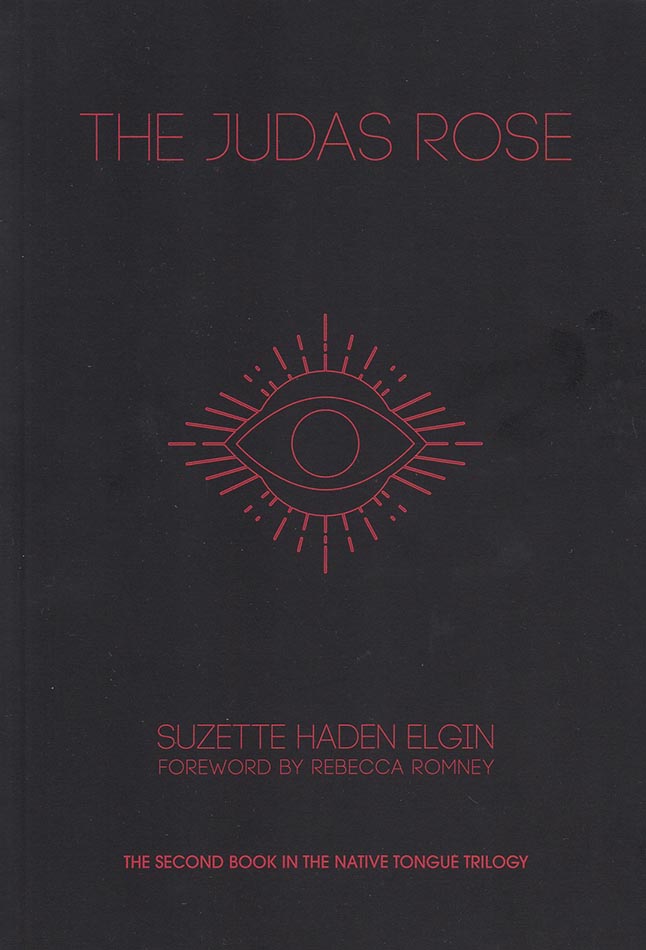
The Judas Rose
In the second volume of the Native Tongue trilogy, the time has come for Láadan—the secret language created to resist an oppressive patriarchy—to empower womankind worldwide. To expand the language’s reach, female linguists translate the Bible into Láadan, and a group of Roman Catholic nuns are tasked to spread the language. But when outraged priests detect their sabotage, they send a double agent to infiltrate and destroy the movement from the inside.
With a foreword by Rebecca Romney
Suzette Haden Elgin (born Patricia Anne Wilkins; 1936–2015) was an American science fiction author. She founded the Science Fiction Poetry Association, and was considered an important figure in the field of science fiction constructed languages. Elgin was also a linguist; she published non-fiction, of which the best-known is the Gentle Art of Verbal Self-Defense series.
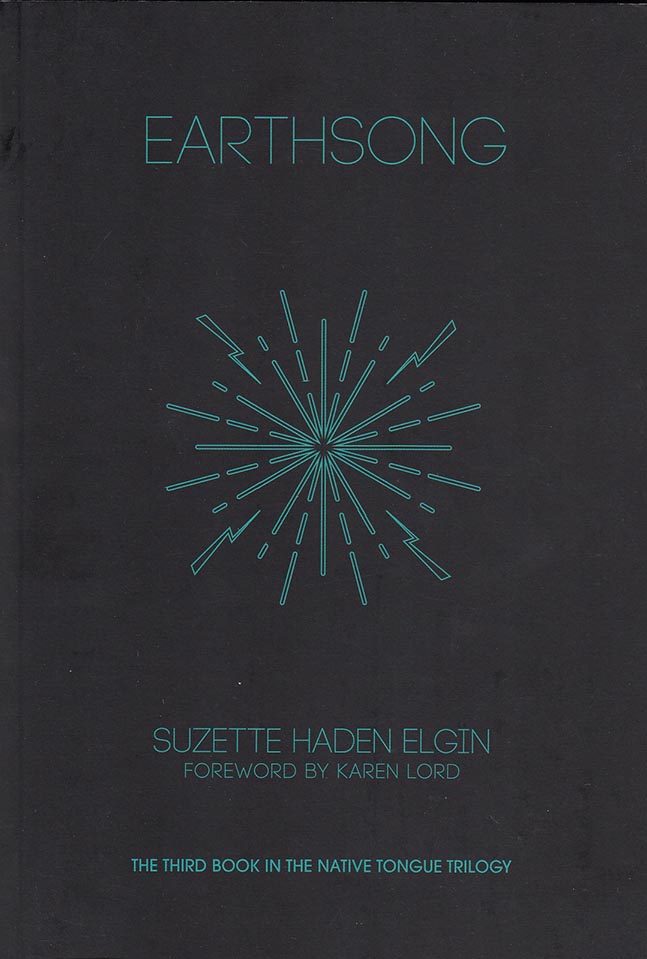
Earthsong
The final book in the Native Tongue Trilogy.
The interstellar Consortium of Planets has forsaken the irredeemably violent Earth, condemning the planet to economic and ecological chaos. As the Consortium prepares to euthanize the planet, women freedom fighters are offered one last chance to correct men’s brutal nature and stop the planet’s annihilation. In the stunning conclusion to the Native Tongue trilogy, female linguists must once again come forward to ensure the survival of humanity.
Suzette Haden Elgin (born Patricia Anne Wilkins; 1936–2015) was an American science fiction author. She founded the Science Fiction Poetry Association, and was considered an important figure in the field of science fiction constructed languages. Elgin was also a linguist; she published non-fiction, of which the best-known is the Gentle Art of Verbal Self-Defense series.

Dodie Bellamy Is on Our Mind
Anthony Huberman, Jeanne Gerrity
Examining the genre-bending writing of Dodie Bellamy, whose work has focused on sexuality, politics, feminism, narrative experimentation, and all things queer.
Dodie Bellamy Is on Our Mind is the first major publication to address Bellamy's prolific career as a genre-bending writer. Megan Milks made several trips to San Francisco in order to spend time with Bellamy and craft a provocative and fascinating profile of the writer. Originally delivered as a lecture at the Wattis Institute, Andrew Durbin's text takes the form of a personal essay, expertly weaving anecdotes of his own encounters with Bellamy's writing with insights into broader themes in her work. Academic Kaye Mitchell takes a close look at the role of shame and its relationship to femininity in particular texts by Bellamy. And Bellamy and her late husband Kevin Killian offer deeply personal, emotionally wrenching ruminations on topics from the mundane (drawing) to the profound (mortality). These texts, alongside archival photos and a complete bibliography make, this book an important compendium on Bellamy.
Dodie Bellamy (b. 1951, in North Hammond, Indiana) has lived and worked in San Francisco since 1978. A vital contributor to the Bay Area's avant-garde literary scene, Bellamy is a novelist and poet whose work has focused on sexuality, politics, feminism, narrative experimentation, and all things queer. In her words, she champions “the vulnerable, the fractured, the disenfranchised, the fucked-up.”
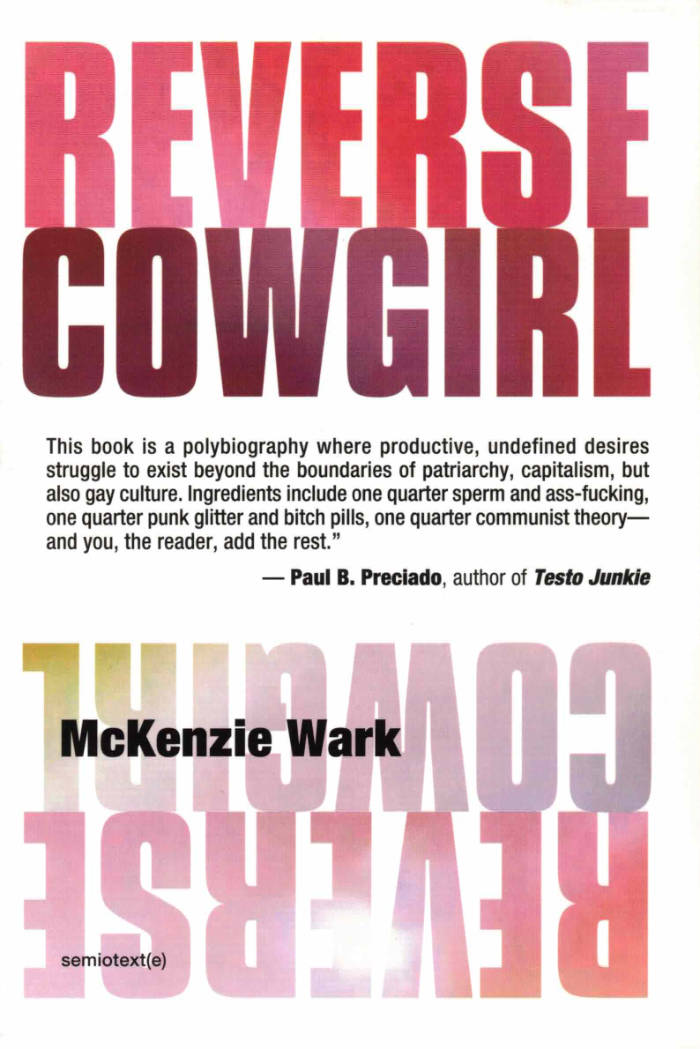
Reverse Cowgirl
McKenzie Wark invents a new genre for another gender: not a memoir but an auto-ethnography of the opacity of the self.
Another genre for another gender.
What if you were trans and didn't know it? What if there were some hole in your life and you didn't even know it was there? What if you went through life not knowing why you only felt at home in your body at peak moments of drugs and sex? What if you expended your days avoiding an absence, a hole in being? Reverse Cowgirl is not exactly a memoir. The author doesn't, in the end, have any answers as to who she really is or was, although maybe she figures out what she could become.
Traveling from Sydney in the 1980s to New York today, Reverse Cowgirl is a comedy of errors, chronicling the author's failed attempts at being gay and at being straight across the shifting political and media landscapes of the late twentieth century. Finding that the established narratives of being transgender don't seem to apply to her, Wark borrows from the genres of autofiction, fictocriticism, and new narrative to create a writing practice that can discover the form of a life outside existing accounts of trans experience: an auto-ethnography of the opacity of the self.
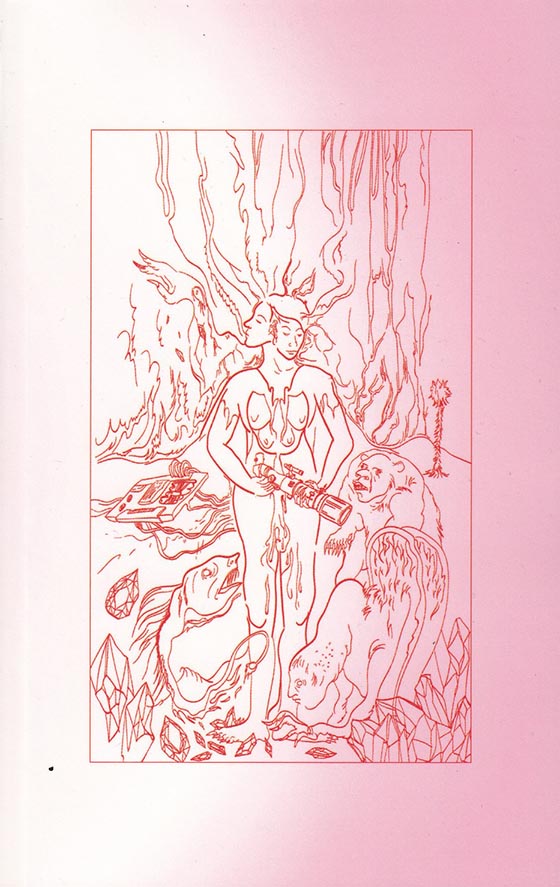
The Blazing World
Published in 1666, The Blazing World stands as one of the first Western works of Science Fiction. In its assertion that all animal flesh is made of rational matter (including that of the female body) Margaret Cavendish wrote the only 17th century text of its kind - a book of gendered natural philosophy.
Caught in frost at the North Pole, Cavendish tells the story of a woman who is saved by crossing over from our world, to a whole new Utopia. Amongst gems and stars she finds a city of half-human half-beast scientists. Worm- Men, Bear-Men, Bird-Men and Fish-Men welcome her to their land. Together they toil in their investigations, describing Nature afresh.
Cavendish predicted motors, submarines and nautical machinery long before these technologies came to exist in the present. As more than just a work of fantastical invention, The Blazing World is important for its portrayal of invention itself. Enlightenment technology is described here as a recourse to protect the world. All of it. The feeling and reasoning matter of all animals, minerals, trees and plants is significant for its proto-environmentalism and for its path-setting form: philosophy as poetry; science as poetry.
With a foreword by Emile Frankel.
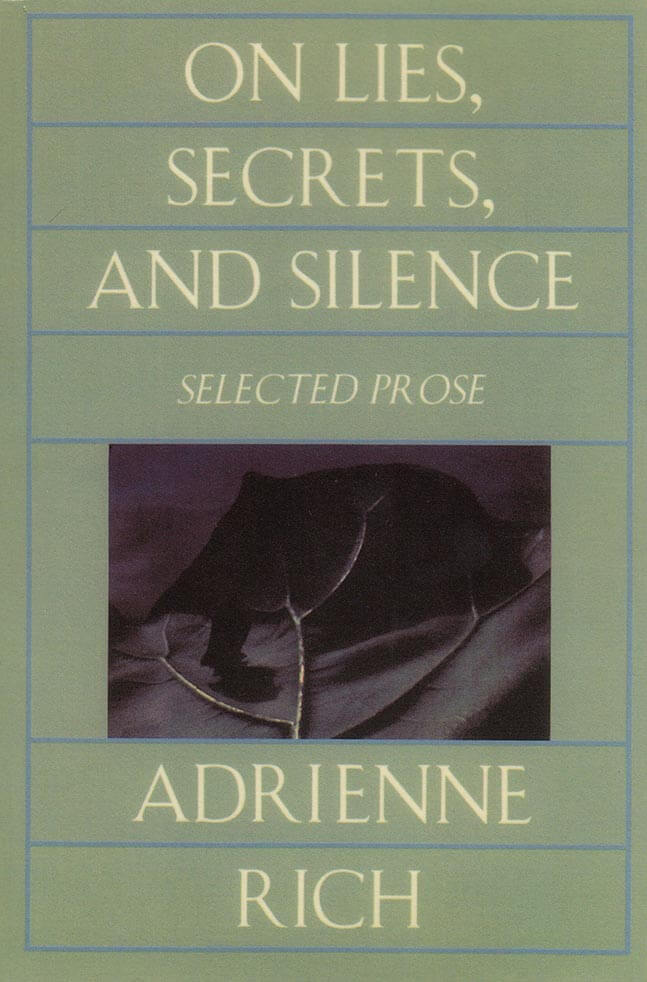
On Lies, Secrets And Silence
Collection of early prose writings by Adrienne Rich. On Lies, Secrets, and Silence is a sort of travel diary, documenting Adrienne Rich's journeys to the frontier and into the interior. It traces the development of one individual consciousness, 'playing over such issues as motherhood, racism, history, poetry, the uses of scholarship, the politics of language.' Rich has written a headnote for each essay, briefly discussing the circumstances of its writing.
Adrienne Rich (1929–2012) was for decades among the most influential writers of the feminist movement and one of the best-known American public intellectuals. She wrote two dozen volumes of poetry and more than a half-dozen of prose. Her constellation of honors includes two National Book Awards, a MacArthur Foundation “genius” grant, and a Medal for Distinguished Contribution to American Letters by the National Book Foundation. Ms. Rich’s volumes of poetry include The Dream of a Common Language, A Wild Patience Has Taken Me This Far, An Atlas of the Difficult World, The School Among the Ruins, and Telephone Ringing in the Labyrinth. Her prose includes the essay collections On Lies, Secrets, and Silence; Blood, Bread, and Poetry; an influential essay, “Compulsory Heterosexuality and Lesbian Existence,” and the nonfiction book Of Woman Born, which examines the institution of motherhood as a socio-historic construct. In 2010, she was honored with The Griffin Trust for Excellence in Poetry's Lifetime Recognition Award.
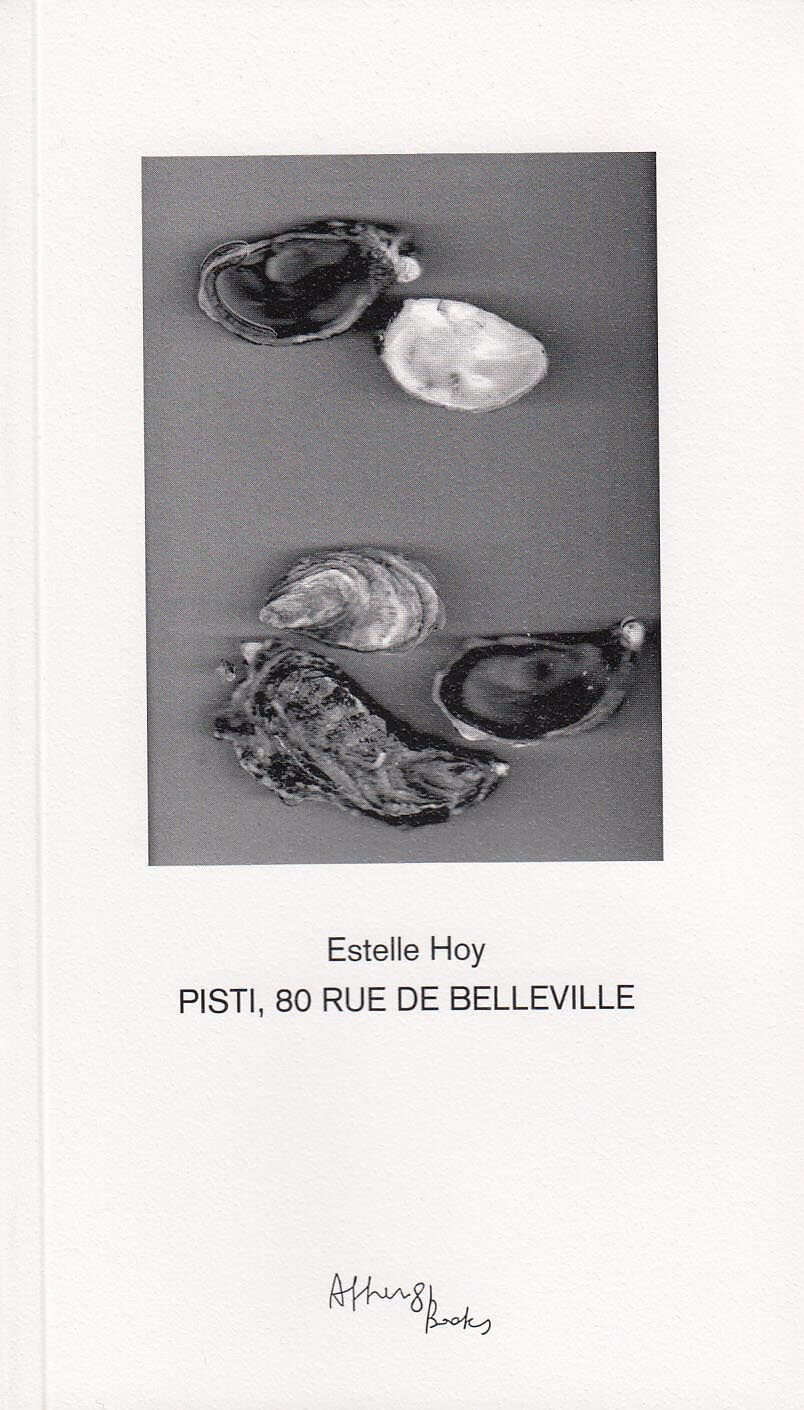
Pisti, 80 rue de Belleville
Pisti, 80 rue de Belleville is Estelle Hoy’s latest novel.
Elke is a young academic with a troubled past that keeps spilling onto her present. Just as she is about to leave town for a writing retreat, she meets Pisti, a charismatic, hard-boiled but luscious Hungarian left activist, who runs an anarchist collective in Paris. Over one night in a Belleville apartment, old friends and new lovers discuss–and act–polyamory, politics, and the art of conversation.
A wry exploration of the seductive allure of tropes and cliché in the art world and politics, Pisti is also an experiment in writing, shamelessly flirting with namedropping and appropriation. The character of Pisti was appropriated from Chris Kraus’ novel Torpor.
Pisti and it's blasphemy against the left and art world is not apostasy, but rather a stepping away from a teleological view of politics and instead, a radical reimagining of the role of incompatibilities, partial identities, cliché and perhaps ultimately, the unresolvedness of hypocrisy. Which is to say, not taking things too seriously, in order to take them seriously. - Estelle Hoy

Sirens
‘Masturbation in between the crimes against you will become a deciding matter in the kangaroo court. Philosophical questions will be answered without inquiry.’
If you have ever wondered how a cross between a funding application gone wrong and a tabloid column about the art world would read, this is it. Mellor presents a unique combination of novel and image, creating a polymorphous narrator who moves between personifications. Perhaps the most hazardous of these is Tippy Rampage, who is satisfyingly livid with the state of, well, everything.
In a series of paintings, female police officers from British television shows such as Happy Valley and The Bill are positioned in an array of apocalyptic settings: freezing, burning, and backdropped by flooding. The accompanying text chronicles an acute feeling of being watched, what it feels like to watch whoever is watching you, or, as Mellor writes, how it feels to be kettled in your own flat, by your own paintings.
Fragmented accounts map the protagonist’s shifting relationship to crime, gender, class and sexuality from multiple perspectives: as a child in Gamesley in the ‘70s, a lesbian performer in sex clubs in the mid ‘90s, an artist with and without gallery representation, and as a lecturer within an academic institution. These changes of position mix the language of a rally cry with an acerbic satire of the authorial voice and everyone they encounter.
Published by Montez Press, Sirens is the first novel by Dawn Mellor and includes the complete set of the Sirens paintings.
Dawn Mellor (b.1970) is an artist based in London, who has been exhibiting internationally since the 1990s. Solo exhibitions and special projects include Sixty Years at Tate Britain; London, Vile Affections at Studio Voltaire; London, Dawn Mellor at The Migros Museum; Zurich, Sirens at Team Gallery; New York, Madame X and The Party Tricks at Victoria Miro; London, Michael Jackson On The Wall at The National Portrait Gallery; London (touring), What Happened to Helen? Focal Point Gallery; Southend and Malerei, Böse at Kunstverein; Hamburg.

The Baudelaire Fractal
One morning, Hazel Brown awakes in a badly decorated hotel room to find that she's written the complete works of Charles Baudelaire. In her bemusement the hotel becomes every cheap room she ever stayed in during her youthful perambulations in 1980s Paris ... This is the legend of a she-dandy's life. Part magical realism, part feminist ars poetica, part history of tailoring, part bibliophilic anthem, part love affair with nineteenth-century painting, The Baudelaire Fractal is poet and art writer Lisa Robertson's first novel.
'As far as I'm concerned, it's already a classic.' - Anne Boyer

The Hundreds
Kathleen Stewart, Laurent Berlant
In The Hundreds Lauren Berlant and Kathleen Stewart speculate on writing, affect, politics, and attention to processes of world-making.
The experiment of the one hundred word constraint, each piece is one hundred or multiples of one hundred words long, amplifies the resonance of things that are happening in atmospheres, rhythms of encounter, and scenes that shift the social and conceptual ground.
What's an encounter with anything once it's seen as an incitement to composition? What's a concept or a theory if they're no longer seen as a truth effect, but a training in absorption, attention, and framing?
The Hundreds includes four indexes in which Andrew Causey, Susan Lepselter, Fred Moten, and Stephen Muecke each respond with their own compositional, conceptual, and formal staging of the worlds of the book.

Night Philosophy
Night Philosophy is collected around the figure of the child, the figure of the child not just as a little person under the tutelage of adults, but also the submerged one, who knows, who is without power, who doesn’t matter. The book proposes a minor politics that disperses all concentrations of power. Fanny Howe chronicles the weak and persistent, those who never assimilate at the cost of having another group to dominate. She explores the dynamics of the child as victim in a desensitized era, when transgression is the zeitgeist and the victim–perpetrator model controls citizens. With an afterword by Chris Kraus.
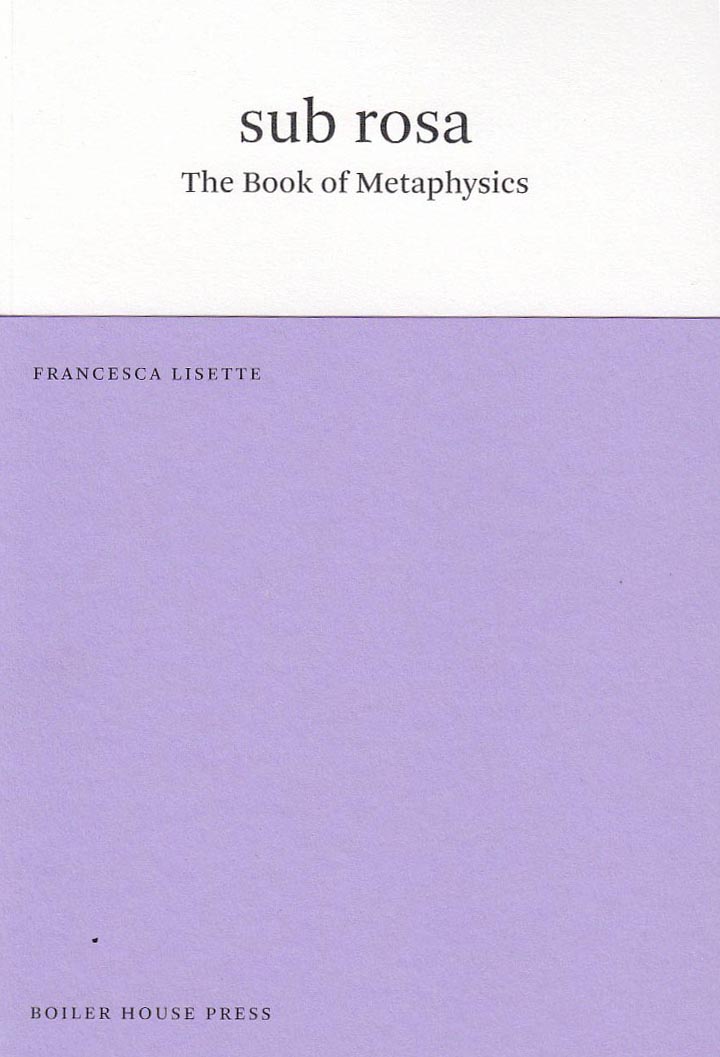
Sub Rosa
sub rosa: The Book of Metaphysics is a three-part interrogation of love, gender, ritual and the body. It heralds a new kind of poetic thinking, one that seeks to articulate and enact a mode of resistance to the obstinacy of present conditions, but which focuses on embodiment, tenderness and optimism. It wants to break present paths and contribute to a collective imagining of a different future; a record of and a practice towards healing.

Les Guérillères (English edition)
Les Guérillères imagines the attack on the language and bodies of men by a tribe of warrior women. Among the women’s most powerful weapons in their assault is laughter, but they also threaten literary and linguistic customs of the patriarchal order with bullets. In this breathtakingly rapid novel first published in 1969, Wittig animates a lesbian society that invites all women to join their fight, their circle, and their community.
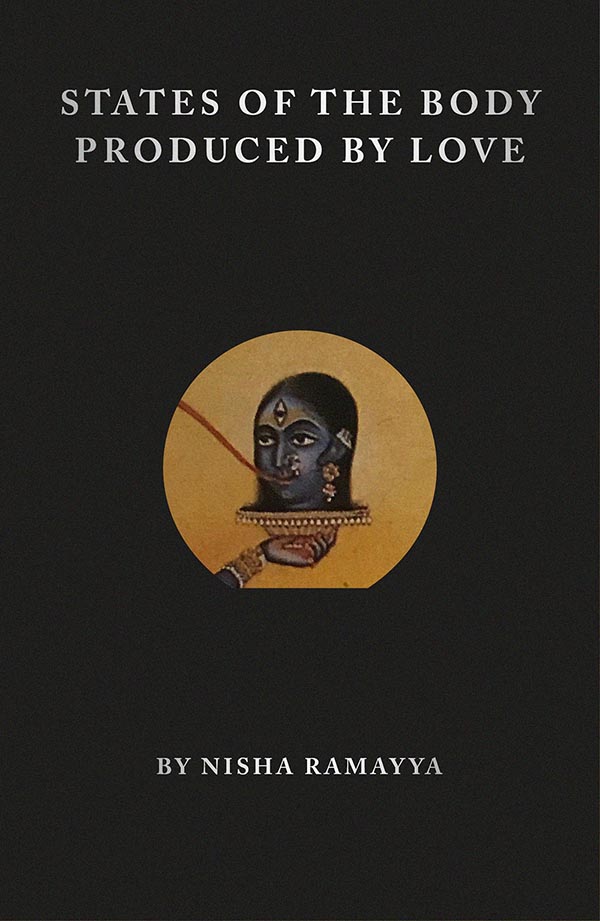
States of the Body Produced by Love
States of the Body Produced by Love is a modern mystical journey through love – a many-headed snake twisting through devotion, sacrifice and the dream of returning home.
In her visionary debut, Nisha Ramayya conjures an opalescent world by way of Tantric ritual and myth. Thousand-petalled lotuses bloom inside skulls, goddesses with dirty feet charm honeybees, strains of jazz standards bleed into anti-national anthems. States of the Body Produced By Love weaves essays, poetry and images together to offer fierce meditations on diasporic identity, language and resistance. From grief to bliss, this book explores the many states of the body seized by love in an incantation that never leaves its hold.